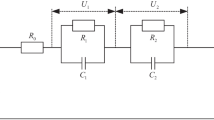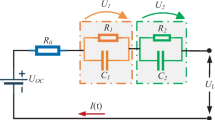Abstract
Lithium-ion batteries play a pivotal role in diverse applications, necessitating the precise estimation of their parameters for safe and efficient energy utilization. In the context of ternary lithium-ion battery research, this study introduces the cosine control whale optimization (CCWO) method to real-time optimization of the forgetting factor. Concurrently, an innovative multi-scale error feedforward extended double Kalman filter (EFDKF) algorithm, featuring model error feedforward, is presented for dynamic optimization of the state noise covariance matrix. This approach diminishes reliance on the model while jointly estimating the state of charge (SOC) and state of health (SOH). The algorithm’s feasibility is validated under varied operational conditions, encompassing both normal and low temperatures. The maximum absolute errors of SOC and SOH estimation are 1.09% and 3.16% at normal temperature, and 3.46% and 4.96% at low temperature, respectively. The results affirm the algorithm’s enhanced precision in joint SOC and SOH estimation, heightened robustness, and superior convergence. This contribution introduces a novel methodology for lithium-ion battery state estimation.

















Similar content being viewed by others
Data availability
The datasets used or analyzed during the current study are available from the corresponding author upon reasonable request.
References
Zhang R, Xia B, Li B, Cao L, Lai Y, Zheng W et al (2018) State of the art of lithium-ion battery SOC estimation for electrical vehicles. Energies 11:1820. https://doi.org/10.3390/en11071820
Worku BE, Zheng S, Wang B (2022) Review of low-temperature lithium-ion battery progress: new battery system design imperative. Int J Energy Res 46:14609–14626. https://doi.org/10.1002/er.8194
Divakaran AM, Minakshi M, Bahri PA, Paul S, Kumari P, Divakaran AM et al (2021) Rational design on materials for developing next generation lithium-ion secondary battery. Prog Solid State Chem 62:100298. https://doi.org/10.1016/j.progsolidstchem.2020.100298
Li J, Zhao M, Dai C, Wang Z, Pecht M (2021) A mathematical method for open-circuit potential curve acquisition for lithium-ion batteries. J Electroanal Chem 895:115488. https://doi.org/10.1016/j.jelechem.2021.115488
Chen C, Xiong R, Yang R, Li H (2022) A novel data-driven method for mining battery open-circuit voltage characterization. Green Energy Intell Transp 1:100001. https://doi.org/10.1016/j.geits.2022.100001
Xiong X, Wang SL, Fernandez C, Yu CM, Zou CY, Jiang C (2020) A novel practical state of charge estimation method: an adaptive improved ampere-hour method based on composite correction factor. Int J Energy Res 44:11385–11404. https://doi.org/10.1002/er.5758
Liu D, Wang S, Fan Y, Xia L, Qiu J (2022) A novel fuzzy-extended Kalman filter-ampere-hour (F-EKF-Ah) algorithm based on improved second-order PNGV model to estimate state of charge of lithium-ion batteries. Int J Circuit Theory Appl 50:3811–3826. https://doi.org/10.1002/cta.3386
Zhang X, Hou J, Wang Z, Jiang Y (2022) Study of SOC estimation by the Ampere-hour integral method with capacity correction based on LSTM. Batteries 8:170. https://doi.org/10.3390/batteries8100170
Gu T, Sheng J, Fan Q, Wang D (2022) The modified multi-innovation adaptive EKF algorithm for identifying battery SOC. Ionics 28:3877–3891. https://doi.org/10.1007/s11581-022-04603-6
Zhang M, Wang S, Yang X, Xie Y, Liu K, Zhang C (2023) Improved backward smoothing—square root cubature kalman filtering and variable forgetting factor—recursive least square modeling methods for the high-precision state of charge estimation of lithium-ion batteries. J Electrochem Soc 170:030511. https://doi.org/10.1149/1945-7111/acb10b
Feng L, Ding J, Han Y (2020) Improved sliding mode based EKF for the SOC estimation of lithium-ion batteries. Ionics 26:2875–2882. https://doi.org/10.1007/s11581-019-03368-9
Hong J, Wang Z, Chen W, Wang L-Y, Qu C (2020) Online joint-prediction of multi-forward-step battery SOC using LSTM neural networks and multiple linear regression for real-world electric vehicles. J Energy Storage 30:101459. https://doi.org/10.1016/j.est.2020.101459
Ren X, Liu S, Yu X, Dong X (2021) A method for state-of-charge estimation of lithium-ion batteries based on PSO-LSTM. Energy 234:121236. https://doi.org/10.1016/j.energy.2021.121236
Wang S, Fan Y, Jin S, Takyi-Aninakwa P, Fernandez C (2023) Improved anti-noise adaptive long short-term memory neural network modeling for the robust remaining useful life prediction of lithium-ion batteries. Reliab Eng Syst Saf 230:108920. https://doi.org/10.1016/j.ress.2022.108920
Xi C, Kaoru H, Dai Yaping JZ (2020) Estimation of SOC Based on LSTM-RNN and design of intelligent equalization charging system. J Adv Comput Intell Intell Inform 24:855–863. https://doi.org/10.20965/jaciii.2020.p0855
Kaur K, Garg A, Cui X, Singh S, Panigrahi BK (2021) Deep learning networks for capacity estimation for monitoring SOH of Li-ion batteries for electric vehicles. Int J Energy Res 45:3113–3128
Lee G, Kwon D, Lee C (2023) A convolutional neural network model for SOH estimation of Li-ion batteries with physical interpretability. Mech Syst Signal Process 188:110004
Chen L, Lü Z, Lin W, Li J, Pan H (2018) A new state-of-health estimation method for lithium-ion batteries through the intrinsic relationship between ohmic internal resistance and capacity. Measurement 116:586–595
Kong X, Zhang X, Lu N, Ma Y, Li Y (2021) Online smart meter measurement error estimation based on EKF and LMRLS method. IEEE Trans Smart Grid 12:4269–4279
Dawei Q, Zixuan L, Fan Y, Luyan F, Mingyue Z, Haoxuan L (2022) State of charge estimation for the Vanadium Redox Flow Battery based on Extended Kalman filter using modified parameter identification. Energy Sources, Part A: Recovery, Utilization, Environ Eff 44:9747–9763
Wang C, Wang S, Zhou J, Qiao J (2022) A novel BCRLS-BP-EKF method for the state of charge estimation of lithium-ion batteries. Int J Electrochem Sci 17:220431
Chikkalkar SG, Kumar MN, Chidanandappa R (2022) Online State of Charge (SOC) estimation of Lithium-Ion battery using Improved Extended Kalman Filter. 2022 IEEE 2nd Mysore Sub Section International Conference (MysuruCon). IEEE, pp 1–7
Sun H, Wen X, Liu W, Wang Z, Liao Q (2022) State-of-health estimation of retired lithium-ion battery module aged at 1C-rate. J Energy Storage 50:104618. https://doi.org/10.1016/j.est.2022.104618
Yang N, Song Z, Hofmann H, Sun J (2022) Robust State of Health estimation of lithium-ion batteries using convolutional neural network and random forest. J Energy Storage 48:103857. https://doi.org/10.1016/j.est.2021.103857
Lin Z, Hu H, Liu W, Zhang Z, Zhang Y, Geng N et al (2023) State of health estimation of lithium-ion batteries based on remaining area capacity. J Energy Storage 63:107078. https://doi.org/10.1016/j.est.2023.107078
Zhang S, Zhang X (2021) Joint estimation method for maximum available energy and state-of-energy of lithium-ion battery under various temperatures. J Power Sources 506:230132. https://doi.org/10.1016/j.jpowsour.2021.230132
Lai X, Huang Y, Han X, Gu H, Zheng Y (2021) A novel method for state of energy estimation of lithium-ion batteries using particle filter and extended Kalman filter. J Energy Storage 43:103269. https://doi.org/10.1016/j.est.2021.103269
Zhang S, Zhang X (2022) A novel low-complexity state-of-energy estimation method for series-connected lithium-ion battery pack based on “representative cell” selection and operating mode division. J Power Sources 518:230732. https://doi.org/10.1016/j.jpowsour.2021.230732
Wang Y, Zhang C, Chen Z (2016) An adaptive remaining energy prediction approach for lithium-ion batteries in electric vehicles. J Power Sources 305:80–88. https://doi.org/10.1016/j.jpowsour.2015.11.087
Wu T, Liu S, Wang Z, Huang Y (2022) SOC and SOH joint estimation of lithium-ion battery based on improved particle filter algorithm. J Electr Eng Technol 17:307–317
Hu P, Tang W, Li C, Mak S-L, Li C, Lee C (2023) Joint State of Charge (SOC) and State of Health (SOH) estimation for lithium-ion batteries packs of electric vehicles based on NSSR-LSTM neural network. Energies 16:5313
Wei J, Chen C (2021) A multi-timescale framework for state monitoring and lifetime prognosis of lithium-ion batteries. Energy 229:120684
Guo R, Shen W (2021) A review of equivalent circuit model based online state of power estimation for lithium-ion batteries in electric vehicles. Vehicles 4:1–29. https://doi.org/10.3390/vehicles4010001
Li Y, Vilathgamuwa M, Farrell T, Tran NT, Teague J (2019) A physics-based distributed-parameter equivalent circuit model for lithium-ion batteries. Electrochim Acta 299:451–469. https://doi.org/10.1016/j.electacta.2018.12.167
Geng Z, Wang S, Lacey MJ, Brandell D, Thiringer T (2021) Bridging physics-based and equivalent circuit models for lithium-ion batteries. Electrochim Acta 372:137829. https://doi.org/10.1016/j.electacta.2021.137829
Tran M-K, DaCosta A, Mevawalla A, Panchal S, Fowler M (2021) Comparative study of equivalent circuit models performance in four common lithium-ion batteries: LFP, NMC, LMO. NCA Batteries 7:51. https://doi.org/10.3390/batteries7030051
Tran M-K, Mevawala A, Panchal S, Raahemifar K, Fowler M, Fraser R (2020) Effect of integrating the hysteresis component to the equivalent circuit model of Lithium-ion battery for dynamic and non-dynamic applications. J Energy Storage 32:101785. https://doi.org/10.1016/j.est.2020.101785
Luo J, Shi B (2019) A hybrid whale optimization algorithm based on modified differential evolution for global optimization problems. Appl Intell 49:1982–2000. https://doi.org/10.1007/s10489-018-1362-4
Nadimi-Shahraki MH, Zamani H, Asghari Varzaneh Z, Mirjalili S (2023) A systematic review of the whale optimization algorithm: theoretical foundation, improvements, and hybridizations. Arch Computat Methods Eng 30:4113–4159. https://doi.org/10.1007/s11831-023-09928-7
Rana N, Latiff MSA, SiM A, Chiroma H (2020) Whale optimization algorithm: a systematic review of contemporary applications, modifications and developments. Neural Comput Appl 32:16245–16277. https://doi.org/10.1007/s00521-020-04849-z
Mirjalili S, Lewis A (2016) The whale optimization algorithm. Adv Eng Softw 95:51–67. https://doi.org/10.1016/j.advengsoft.2016.01.008
Chakraborty S, Saha AK, Sharma S, Mirjalili S, Chakraborty R (2021) A novel enhanced whale optimization algorithm for global optimization. Comput Ind Eng 153:107086. https://doi.org/10.1016/j.cie.2020.107086
Ding H, Wu Z, Zhao L (2020) Whale optimization algorithm based on nonlinear convergence factor and chaotic inertial weight. Concurr Computn: Pract Experience 32:e5949. https://doi.org/10.1002/cpe.5949
Funding
The work is supported by the National Natural Science Foundation of China (Nos. 62173281), and the Natural Science Foundation of Sichuan Province (2023NSFSC1436).
Author information
Authors and Affiliations
Contributions
J.J.Tao: conceptualization, methodology, software, investigation, formal analysis, writing—original Draft; S.L.Wang: data curation; W.Cao: visualization, investigation; M.Y.Zhang: resources, supervision; C.Wang: validation.
Corresponding author
Ethics declarations
Ethical approval
Not applicable.
Competing interests
The authors declare no competing interests.
Additional information
Publisher's Note
Springer Nature remains neutral with regard to jurisdictional claims in published maps and institutional affiliations.
Rights and permissions
Springer Nature or its licensor (e.g. a society or other partner) holds exclusive rights to this article under a publishing agreement with the author(s) or other rightsholder(s); author self-archiving of the accepted manuscript version of this article is solely governed by the terms of such publishing agreement and applicable law.
About this article
Cite this article
Tao, J., Wang, S., Cao, W. et al. Improved multi-scale cosine control whale optimization–error feedforward double Kalman filtering for the online state of charge and state of health co-estimation of lithium-ion batteries. Ionics 30, 2039–2053 (2024). https://doi.org/10.1007/s11581-024-05428-1
Received:
Revised:
Accepted:
Published:
Issue Date:
DOI: https://doi.org/10.1007/s11581-024-05428-1




